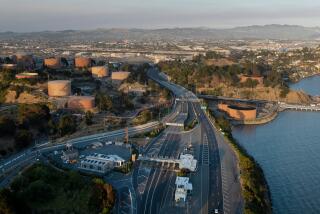Chevron to Halt Offshore Oil Production
- Share via
Chevron Corp. said Thursday it canceled the sale of its stake in the Point Arguello offshore oil field and would begin to shut down production.
San Francisco-based Chevron said the planned sale of its 25% stake in three oil platforms at Point Arguello had collapsed. Chevron had agreed to sell its share of the field to closely held Venoco Inc. for an undisclosed sum.
Chevron, which also operates production at the 25,000 barrel-per-day oil field, decided to begin tapering off output as of May 1 because the deal fell through.
“It’s been part of corporate strategy to no longer produce oil in offshore California,” Chevron spokesman Ed Spaulding told Reuters. “Once the sale was not successful, we decided, as of May 1, to begin shutting down production. Buyers of that crude may need to make adjustments.”
The Point Arguello project, one of the largest U.S. offshore finds ever with initial recoverable reserves estimated at 300 million barrels, became a symbol of the fight between environmentalists and the oil industry over drilling off California’s coast.
Discovered in 1981, the Point Arguello field was ready to start up by December 1987, but that was delayed until mid-1991 by local opposition to the use of tankers to carry the oil.
Spaulding said one of the three platforms at the field had stopped operating so far and estimated it would take four months to shut down production entirely. The Point Arguello field is located off Santa Barbara County.
Chevron had agreed in November to sell its stake in Point Arguello’s three platforms to Venoco. The Arguello field was Chevron’s last remaining offshore production site at what was once one of the largest U.S. offshore finds ever.
Spaulding said Chevron was working to ensure the shutdown was not irreversible and expected its major partners, Phillips Petroleum Co. and Texaco Inc., to designate a new operator.
Chevron will continue to look for a buyer for its stake in the field, he added.
At its peak in 1993, the field produced more than 80,000 barrels a day of oil equivalent, but that has since fallen to about 27,700 barrels.
Chevron’s shares fell $2.25 to close at $97.81 on the New York Stock Exchange.
Using tankers to carry the oil to onshore refineries was hotly contested by residents of Santa Barbara, mindful of a huge 1969 oil spill from a Unocal Corp. well in the Santa Barbara Channel.
That opposition kept production below maximum levels as oil companies were forced to fight for space on local pipelines. Chevron eventually won approval to use tankers temporarily before switching to an overland pipeline.
More to Read
Inside the business of entertainment
The Wide Shot brings you news, analysis and insights on everything from streaming wars to production — and what it all means for the future.
You may occasionally receive promotional content from the Los Angeles Times.









